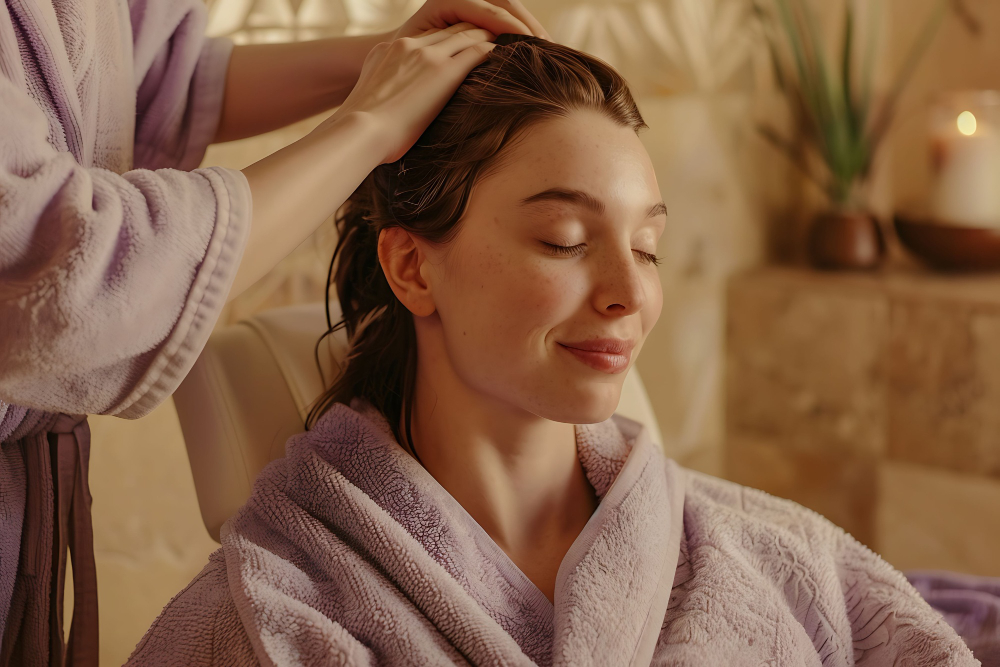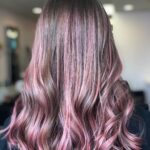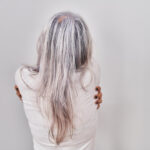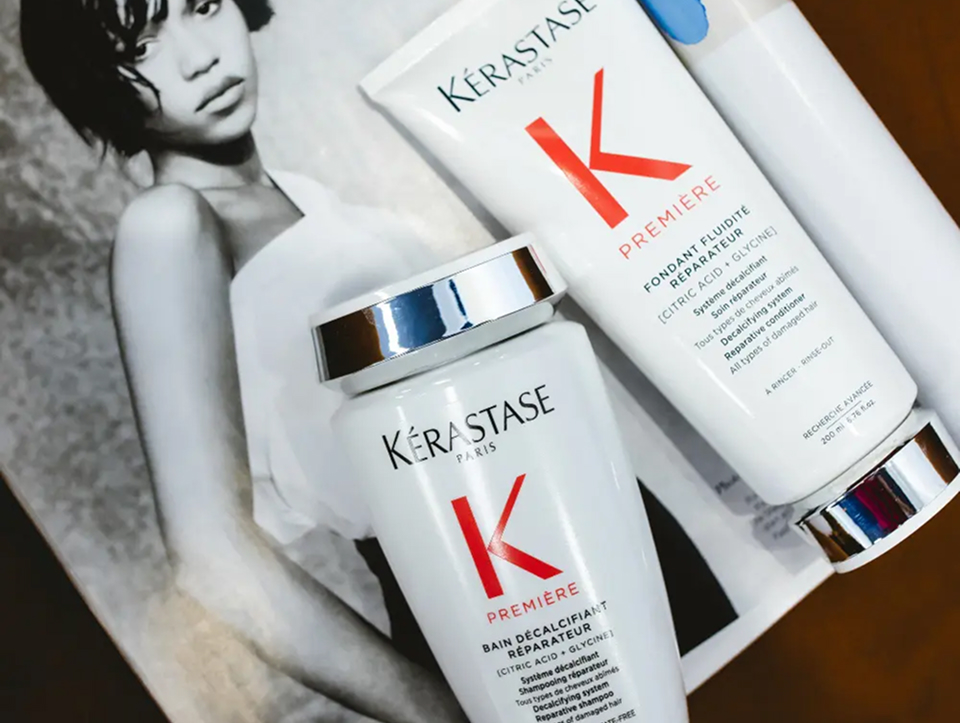Updated on July 17, 2025
Are you constantly scratching your scalp, noticing flakiness, or seeing more hair in the drain than usual? You’re not alone—and it’s not just about dandruff. A healthy scalp is the foundation for strong, beautiful hair. But with so many treatments out there, it’s hard to know what works and what’s just hype.
That’s where scalp therapy comes in.
At Häste Urban Hair Spa, we offer personalized scalp therapy services to address a range of issues, including dryness, itchiness, hair thinning, and inflammation. In this guide, we’ll show you how to identify your scalp type, choose the right products, and explore both professional and at-home treatments that work. Let’s get your scalp back to a healthy, happy balance—because thriving hair starts at the root.
What Is Scalp Therapy?
Scalp therapy refers to a range of treatments and products designed to cleanse, balance, hydrate, and treat various scalp issues, including dandruff, dryness, irritation, excessive oil production, and hair thinning. It includes exfoliation, serums, deep-cleansing shampoos, and sometimes professional treatments that target the health of your hair follicles.
How to Identify Your Scalp Type Before Treatment

Before exploring all the scalp treatments, take control of your scalp health today. It empowers you to choose the right products and treatments that cater to your unique needs. Here are some examples of different scalp types:
- Oily Scalp: When your hair appears limp after washing and feels greasy, you likely have an oily scalp. The scalp produces excessive oil, leading to clogged pores and other related issues. This is where a treatment for an oily scalp can help.
- Sensitive Scalp: Your scalp will be more prone to redness, itching, and irritation. To prevent worsening the symptoms, you must treat your scalp gently.
- Dry Scalp: A dry scalp causes flakes and itching, making you uncomfortable. It can result from a lack of moisture or other skin disorders, such as psoriasis or eczema.
- Normal Scalp: A normal scalp with no excessive oil or dryness is healthy and balanced.
- Combination Scalp: If you notice oily and dry patches, it can become challenging to control the areas as you need different scalp treatments.
Common Scalp Conditions Scalp Therapy Can Treat

Great. Now that you have identified your scalp type, the next step is to pick an appropriate treatment. But first, you need to understand the conditions and symptoms. Here are some common scalp problems.
Dandruff
Characterized by white or yellow flakes, dandruff is often caused by dry skin, oil buildup, or a yeast-like fungus. Targeted shampoos and treatments can relieve symptoms.
Alopecia (Hair Loss)

This can result from autoimmune disorders, hormonal imbalances, or genetic factors. Some scalp therapies aim to stimulate follicles and reduce inflammation.
Seborrheic Dermatitis (Scalp Eczema)
Often triggered by allergens or stress, this appears as redness and flaking in oily areas of the scalp.
Scalp Psoriasis
This condition leads to red, scaly patches that may extend beyond the hairline. It often requires prescription treatments or intensive hydration therapy.
Do You Need Scalp Therapy? Self-Assessment Guide
Now that you understand the different types of scalps and disorders, you can evaluate your condition and choose the appropriate scalp therapy treatment. We recommend asking yourself some questions while examining your scalp:
- How does your scalp feel? Is it dry, normal, greasy, or sensitive?
- Do you have an itchy scalp with flakiness?
- Or is the scalp red and inflamed?
- Are you seeing hair loss that can be a concern?
- Have you noticed any changes in your scalp health or the appearance of your hair?
When you ask yourself these self-assessment questions, you can determine the current state of your scalp and identify any underlying issues that may need attention.
However, if you’re unsure about the type of scalp you have, we at Häste are a hair and scalp spa that can help. Book an appointment today to receive our personalized recommendation for the best scalp therapy treatment tailored to your needs.
👉 Worthy Read: How Often Should You Get a Scalp Treatment?
Scalp Therapy Treatments: How to Choose the Right One

Considering your scalp condition and type will help you evaluate different treatment options. Here is a brief overview of the various scalp therapy treatments available.
1. Shampoo and Conditioners
Choose sulfate-free options tailored to your scalp type. For dandruff, look for ingredients such as zinc pyrithione, ketoconazole, or coal tar. For dry scalps, choose formulas that contain aloe vera, glycerin, or hyaluronic acid. Sensitive scalps benefit from hypoallergenic or fragrance-free products.
2. Serums and Scalp Tonics

Scalp serums address specific concerns, including dryness and inflammation. Tea tree oil and salicylic acid help with dandruff. Peptide-based serums stimulate growth in thinning areas.
3. Natural Oils and DIY Remedies
If you have scalp issues and need relief, consider using essential oils such as peppermint, rosemary, and lavender. You can also choose coconut oil and aloe vera gel as natural therapies for their hydrating and soothing effects.
4. Lifestyle Support
A well-balanced diet, staying hydrated, and controlling stress can help improve scalp health. Avoid hairstyles that pull too tightly on your scalp, as they can also contribute to scalp problems and hair loss.
5. Read The Product Labels and Reviews

When you carefully study the product labels to verify if it is safe for your unique scalp type, it can help improve your condition. Also, check reviews on the shampoo and other products you plan to choose, as other people’s experiences using these products can be helpful.
6. Allergy Precautions and Patch Testing
Lastly, always perform a patch test before you use a new product. If the product contains powerful substances, check for adverse reactions and allergies. Suppose you are uncertain about a specific product. In that case, it is advisable to consult a dermatologist before incorporating it into your scalp care routine, especially if you have a history of sensitivities and allergies.
Worthy Note: Are you familiar with the various salon glossary terms? Check them out here to equip yourself with the correct terms when visiting the salon next time.
Wrap-Up: Are You Ready to Reboot Your Scalp Health?
Choosing the right scalp therapy starts with understanding your scalp’s needs. Whether you’re dealing with flakes, dryness, irritation, or hair loss, the proper treatment can restore your scalp’s balance and boost your hair’s growth potential.
At Häste Urban Hair Spa, we combine expert techniques with holistic products to give your scalp exactly what it needs. Book your personalized scalp therapy session today and experience the difference a healthy scalp can make.
👉 Need split end repair too? Our scalp therapy often complements deep conditioning and split-end repair treatments. Ask us how during your visit!
FAQ
What is scalp therapy treatment?
Scalp therapy encompasses a range of procedures and products designed to maintain a healthy scalp. These treatments can address multiple issues, including dandruff, dryness, itchiness, hair thinning, and scalp irritation. They may include exfoliation, cleansing, hydration, and the application of specialized serums or oils.
Why is scalp health important?
A healthy scalp is essential for healthy hair growth. Issues such as dandruff, excessive oil production, or dryness can negatively impact hair follicles, potentially leading to hair thinning, breakage, or other scalp conditions. Regular scalp therapy can help balance the scalp environment, promoting optimal hair growth and reducing issues.
How do I know if I need a scalp therapy treatment?
Signs that you may need scalp therapy include itching, flakiness, redness, excessive oiliness, or hair loss. If you are experiencing any of these symptoms or have a diagnosed scalp condition, such as psoriasis or seborrheic dermatitis, a scalp therapy treatment may be beneficial.
How often should I get scalp therapy treatments?
The frequency of scalp therapy treatments depends on the specific condition and the type of treatment being administered. Generally, once-a-week or bi-weekly treatments are sufficient for most people. However, if you have a particular scalp issue, it may require more frequent or specialized treatment.
Can I perform scalp therapy treatments at home, or should I visit a professional?
Many scalp therapy treatments can be done at home using over-the-counter products or natural ingredients. However, consulting a professional is advisable if you have a severe scalp condition or are unsure of the best course of treatment.









